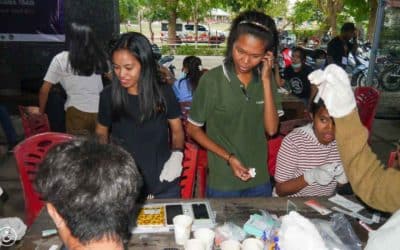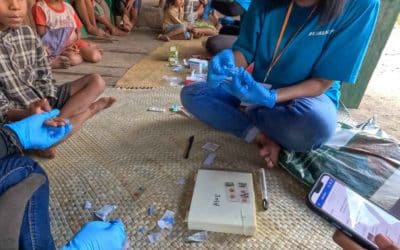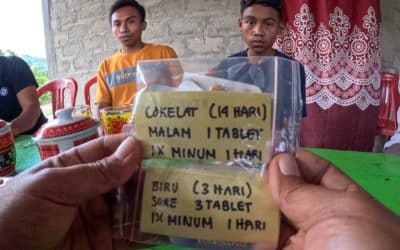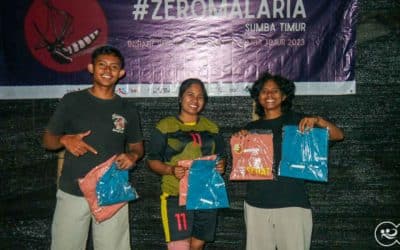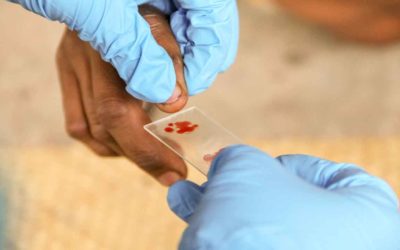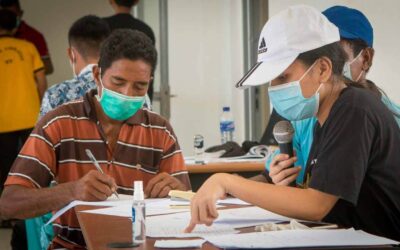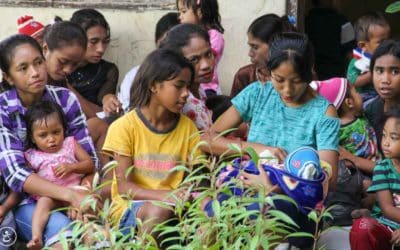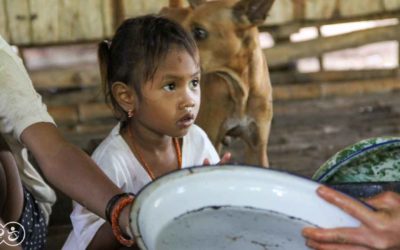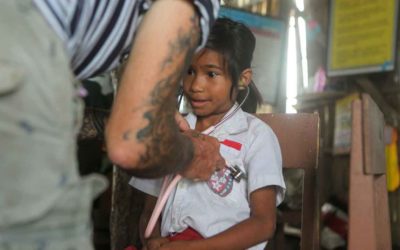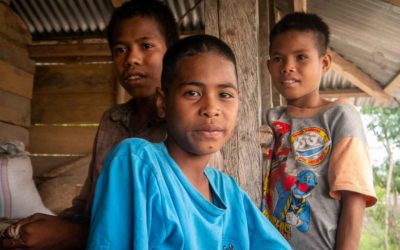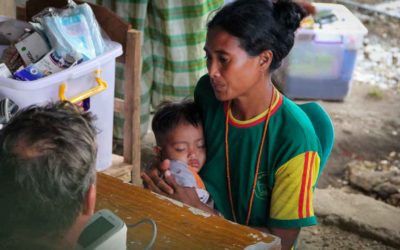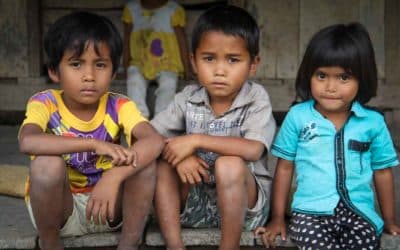In the fight against malaria in East Sumba, volunteers stand at the front lines, embodying hope, dedication, and community-driven action. Discover how these everyday heroes, contributing to Fair Future Foundation’s #ZeroMalaria initiative, are changing the landscape of public health. Their hands administer life-saving treatments, their voices educate vulnerable communities, and their efforts are the cornerstone of a better, healthier future.
In the scattered hills of East Sumba, 5,300-litre ferrocement tanks collect each drop of rain. Families help build and maintain them. Children drink safely, and women no longer have to carry 20-kilo jerrycans for hours. Water near the house is a primary source of health care.
Donate
Support Care
Programs
All projects
Quick News
Field updates
Stories
Field stories
Educating communities about Plasmodium parasites and their role in malaria transmission.
#ZeroMalaria Campaign: Fair Future’s Life-Saving Mission
Championing the #ZeroMalaria Cause: Fair Future’s Tireless Efforts in Sumba East. This image reflects our unwavering commitment to the #ZeroMalaria cause. Together, we’re illuminating a path to a malaria-free future. Each test, done twice for accuracy, symbolises hope in the fight against malaria. Our teams also collect essential socio-medical data to track progress.
In the heart of one of Indonesia’s poorest and most disadvantaged regions, as well as one of the highest malaria prevalence areas in the world, Fair Future, in collaboration with Kawan Baik and Sumba Volunteer, is waging an unrelenting battle against the deadly scourge of malaria. Under the banner of #ZeroMalaria, this vital campaign is not just about medical intervention; it’s about transforming lives and ensuring every community member has a chance at a healthier future.
The Challenge of Malaria in Sumba East: Sumba East is a region where basic amenities like electricity, clean water, and sanitation facilities are virtually non-existent. Here, people face a daily struggle for survival against malaria and various other infectious diseases. Malaria, in particular, poses a significant threat to the lives of the local population.
Malaria is transmitted through the bite of infected female Anopheles mosquitoes and can have devastating consequences if left untreated. The disease can rapidly progress from fever and chills to severe anaemia, organ failure, and even death. Vulnerable groups, such as pregnant women and children, are at higher risk.
Fair Future’s Double-Testing Approach: Precision is paramount in the battle against malaria. Fair Future’s dedicated medical teams, including doctors, nurses, and laboratory technicians, work tirelessly to ensure that every case is accurately diagnosed and treated.
Our teams conduct tens of thousands of malaria tests, and each test is done twice – once using rapid diagnostic tests and another through blood tests analyzed using microscopes, all performed directly in the field. This rigorous double-testing approach ensures the highest level of accuracy, especially in an area where access to modern medical facilities is severely limited.
Collecting Socio-Medical Data: Beyond diagnosis and treatment, Fair Future recognises the importance of comprehensive data collection to guide its efforts. The captivating photo accompanying this article shows our teams diligently gathering socio-medical data from every family member and villager. This data is entered into Fair Future’s proprietary application, meticulously developed and funded by the organisation. The application serves as a crucial tool for tracking and tracing the regions where we implement the #ZeroMalaria program.
The Urgent Need for #ZeroMalaria: It’s important to remember that malaria remains a significant threat in regions like Sumba East, where people continue to lose their lives to this preventable and treatable disease. Pregnant women and children are particularly vulnerable.
The #ZeroMalaria program represents a lifeline for these communities, providing medical care, education, and awareness about malaria prevention. Fair Future is committed to ensuring that no one in Sumba East loses their life to malaria, and your support is instrumental in achieving this goal.
In closing, the battle against malaria in East Sumba is ongoing, and the stakes couldn’t be higher. Through #ZeroMalaria, Fair Future is determined to change the narrative, transform these communities, and to save lives. Join us in this life-saving mission!
Thank you very much for your support.
Alex Wettstein – Fair Future Foundation medico-social camp in East Sumba – Rumah Kambera, Lambanapu,
September 21st, 2023.
Combatting Malaria in Sumba: A Crucial Health Battle
This new "picture of the day", shows a 14-year-old young kid suffering from malaria for the second time, whom we have tested twice and is receiving his medical treatment. We explained that he must take these medications every day for fourteen days. We explain why and the risks if he doesn't. A nurse is present and will ensure regular check-ups to ensure everything is going well for him.
The fight against malaria in Sumba is an intense and crucial battle for the population's health. Every positive case, like that of this young man from Lulundilu, Kecermatan Mahu, East Sumba, requires immediate medical intervention and rigorous treatment that extends over a period of 14 days without interruption.
This young man belongs to a large family of seven siblings, all of whom have been affected by malaria before. Although he is fortunate not to have lost any close family members to this disease, it is essential to understand that malaria is wreaking havoc in this region. Our team visited his home and conducted two tests to confirm his infection, first with a rapid test and then with blood tests and microscopic analysis. Both times, the results were positive, indicating that he was carrying the Plasmodium falciparum parasite.
As with all malaria cases, Fair Future takes over the medical treatment. It is crucial that this young man diligently follows his treatment because the risks to his life are extremely high if he does not. That's why we have mobilized staff from the nearest healthcare centre, Puskesmas Mahu, to ensure that he receives his medical treatment appropriately and monitor his progress.
It is important to emphasize that since the beginning of 2023, in Sumba alone, 18 pregnant women have lost their lives due to malaria due to a lack of screening, information, proper medical care, and appropriate treatment. This tragedy highlights the need to strengthen our fight against malaria and ensure equitable access to medical care for all community members.
The Fair Future team remains determined to do everything possible to end this threat to public health and ensure that every individual has access to the necessary medical care to combat malaria and other serious illnesses. Your support and donations are essential for this mission's success and saving lives.
Thank you very much for your support.
Alex Wettstein – Fair Future Foundation medico-social camp in East Sumba – Rumah Kambera, Lambanapu,
September 21st, 2023.
Crucial Preparation for Malaria Eradication in Sumba East
“In the heart of Sumba East, a coalition of heroes united for an epic battle against malaria. They embarked on a journey fueled by hope, dedication, and unwavering commitment. However, what set the stage for their triumph was the meticulous preparation that underpinned every step. Discover why this groundwork is not just a step but the very foundation of our mission to eliminate malaria and save lives in the remote and underserved regions of Sumba East. Join us as we explore the monumental role of preparation in our heroic quest.
The #ZeroMalariaSumbaTimur program has been successfully implemented
In a concerted effort to fight the endemic scourge of malaria, the Swiss Fair Future Foundation has embarked on an extraordinary mission – the #ZeroMalariaSumbaTimur program. This groundbreaking initiative is taking place in the heart of Southeast Asia, specifically in the remote and underserved eastern expanse of Indonesia known as East Sumba.
Having already screened and treated 2500 individuals across three severely malaria-affected villages in East Sumba, our undertaking is underscored by a tangible impact. This formidable feat, orchestrated through the synergy of committed individuals such as Alandio, Ino, Elthon, Alex, Ayu, Annisa or Ayu, resonates as a testament to unwavering dedication. Over seventy staunch contributors, bolstered by fifty fervent volunteers from diverse corners of Indonesia, assemble with a shared sense of purpose.
Collectively, we have curated a multi-disciplinary team of skilled nurses, physicians, and laboratory specialists, amplifying our medical outreach. This coalition is complemented by clever logistics and data management, facilitated by an innovative application collaboratively developed by the Fair Future and Kawan Baik Foundations.
The core of our effort extends beyond the simple detection of malaria; our priority lies in education and prevention. Empowering communities with knowledge and awareness is our ultimate goal. We disseminate vital information about this dangerous disease through immersive workshops and interactive sessions. Armed with this understanding, individuals cannotntify the symptoms of malaria but also take quick and informed action to avoid potential complications and even death, safeguarding their well-being and others—their relatives.
The tangible impact of this initiative ripples through the lives we touch. Early identification and effective malaria management have resulted in life savings. Additionally, our efforts extend to enlightening local healthcare providers, equipping them with the essential tools and resources for a decisive battle against this relentless disease.
Yet our journey is not free of challenges. Negotiating the region's labyrinthine topography, working with limited resources, and transcending language barriers requires inventive methodologies and a deep sensitivity to indigenous cultures. Establishing a foundation of trust within our communities is an indispensable facet, fostering the adoption of preventive measures and a tendency to seek prompt medical intervention when needed.
We invite you to join our collective effort in the fight against malaria. Hand in hand, we can create a transformative impact, save lives and shape a radiant tapestry of possibility for everyone.
Together, we are joining forces in a powerful effort to combat malaria
A collective initiative against malaria is currently underway in East Sumba, Indonesia. Fair Future, kawan baik, and Sumba Volunteers have joined forces with over 100 volunteers, including doctors, nurses, laboratory technicians, water experts, builders, and government officials. Their primary objective is to eradicate malaria entirely within a practical period, focusing on prevention, diagnosis, and treatment methods.
Malaria Program – Preparing and Mobilizing Resources
As we mentioned in last week’s newsletter, Fair Future Foundation, Kawan Baik Indonesia, and Sumba Volunteer are joining forces to launch a crucial health and medical operation to combat malaria in the Mahu region of East Sumba, Indonesia. The “Malaria Prevention Initiative 2023 – Sumba Timur 2023” aims to prevent, detect, and treat this devastating disease in one of the most affected regions. Malaria has become endemic in this area, establishing itself and finding a conducive environment for its spread, leading to an unprecedented increase in cases in recent months.
Sumba Malaria Prevention Program 2023
Discover how the East Sumba Malaria Prevention Initiative we are presently executing is combatting this destructive ailment. By implementing preventive measures like distributing mosquito nets treated with insecticides and raising awareness on eliminating mosquito breeding sites, this initiative strives to diminish the occurrence of malaria in the area. Witness the combined efforts of Fair Future and Kawan Baik, working together with local authorities and the severely impacted ultra-rural communities, to safeguard the population against this mosquito-transmitted disease.
Behavioral Impacts on Spread of Malaria
Beyond Borders: Fighting Malaria Together in Eastern Indonesia. This new "Picture of the Day" shows a young girl from Lapinu village who appears unwell. Taken in 2020, Alex examined her and used a stethoscope to listen to her heartbeat. In April 2023, we revisited the village as part of the Primary Medical Care program. Unfortunately, the girl contracted malaria and suffered from high fever, body pains, and poor overall health. However, after receiving treatment and giving advice to her mother, the little girl has shown significant improvement after just one month.
Our organisation is dedicated to promoting public health in ultra-rural regions of Indonesia (like here in East Sumba), and we're deeply concerned about the impact of malaria on vulnerable communities, as you know already. Sadly, malaria remains a leading cause of illness and death in Indonesia, particularly in East Sumba, where we are based.
Some little history: The word "malaria" originates in Italian. It comes from the expression "mal'aria", which translates as "bad air". This term was used historically to describe the belief that disease was caused by inhaling polluted or stale air in swampy areas. The Plasmodium parasite is responsible for causing malaria, and research suggests that it has been affecting humans for at least 4,000 years.
Several human behaviours contribute irreparably to the spread or persistence of malaria. Here are some of the factors that lead to an increase in malaria cases:
Failure to prevent mosquito bites, poor waste management, inadequate housing and sanitation, deterioration of hygienic conditions, deforestation, alterations to natural habitats, movement of people, drug resistance*** and misuse, limited access to health services, higher illiteracy rates among younger populations, and lack of community involvement and awareness can all lead to an increase in malaria cases… And this, among other examples!
As a result, many people, particularly children and pregnant women, continue to suffer from this preventable and treatable disease. Our program aims to tackle these issues head-on by implementing various activities to strengthen malaria control efforts in the region. It is crucial to highlight that combatting malaria demands a unified strategy encompassing preventive and therapeutic measures. It also involves initiatives to enhance the environment and living standards of communities affected by the disease.
***The problem of self-medication and the consequent development of resistance to antimalarial drugs are two interconnected challenges that significantly hinder the effective management and control of malaria.
Beyond Borders, Fighting Malaria Together in Eastern Indonesia
Beyond Borders: Fighting Malaria Together in Eastern Indonesia. This new "Picture of the Day" shows three kids between 8 and 12 years old. Children are among the most vulnerable malaria victims in Indonesia, especially in the east of the country and of course here, where we work with Fair Future, Kawan Baik foundations and all our partners and friends.
The health and well-being of children in eastern Indonesia are threatened by malaria, which hinders their growth, development, and quality of life. Our organizations have a deep understanding of the urgency to address this issue, and we are working hard on our disease control program, which is of utmost importance. We have a strong track record of working in these regions where the epidemic affects about 80% of children. Collaborative efforts are underway to combat malaria and prioritize the welfare of children in these areas.
Young children are at a higher risk of contracting malaria due to their underdeveloped immune systems. Living in rural and poor areas with limited access to preventive measures only exacerbates the severity of symptoms if infected. A contributing factor is that young children typically haven't been exposed to the malaria parasite enough times to build up immunity* against it.
It can be challenging for young children in our regions to communicate or identify the symptoms of malaria, and their parents may not be familiar with them either. As a result, affected children may display non-specific symptoms like fever, tiredness, loss of appetite, irritability, and vomiting, which could easily be mistaken for other common childhood illnesses like drinking contaminated water. Consequently, this can cause delays in diagnosing and treating malaria accurately
*Some additional explanation: People living in malaria-endemic areas gradually develop acquired immunity, which reduces their susceptibility to severe infections in the future.
Malaria in East Sumba: All villages turned Red!
This new "Picture of the Day" shows you a brave but sad mom who asks for care for her little boy. She is a courageous but sad mother who seeks care for her little boy, who suffers from Malaria. With pain and more than 40 fever, He is the example of the "typical patient" here: Under five years old, this family lives in an ultra-rural and marginalized area. She is poor, and they don't have access to medical care or enough food and clean water; They don't have toilets either. Moreover, the whole village does not have access to electricity.
The medical staff of Kawan Baik and Fair Future Foundation bring him relief and medicine to lower his fever and get better as soon as possible. We also talk to the mother and give her good advice.
Let me re-explain to you what malaria is and why this disease is hazardous, and the categories of people it affects in the first place:
Malaria is caused by parasites transmitted by the bites of infected mosquitoes. Although anyone can get malaria, specific categories of people are more susceptible to severe illness and complications. We find that the impact of malaria varies by geographic region and local health infrastructure. Our efforts to fight malaria focus on prevention through measures such as the establishment of the Primary Medical Care Program (PMC), mosquito nets, spraying in villages (fogging), and learning to wash with an "ani-malaria or disinfectant" soap, among others.
1. First, children under five: This is because young children have a weaker immune system and have not yet developed immunity to disease. They are more likely to have serious symptoms and complications, including severe anaemia and cerebral malaria, which can be life-threatening. This is the case here: Infant mortality is very high in ultra-rural areas and marginalized populations of East Sumba.
2. But also pregnant women: Of course, malaria can have adverse effects on both the mother and the unborn child. Pregnant women are at an increased risk of developing severe malaria, leading to complications such as maternal anaemia, spontaneous abortion, stillbirth or low birth weight infants. I spoke to you about a similar case in Kabanda, right?
Public health interventions to provide vital advice to the most affected populations via the #kawansehat program are essential. You have to be close to people if you want to advise them on the best way to have a healthier life.
3. Ultra-rural and marginalized populations: Communities living in rural and remote areas, often with limited access to health care, such as here in East Sumba, are disproportionately affected by malaria. Factors such as poverty, lack of knowledge about preventive measures and limited access to health services contribute to malaria's higher prevalence and impact in these communities.
4. Immunocompromised people: People with weakened immune systems, such as those living with HIV/AIDS, are more likely to contract severe malaria. We are also talking about people with chronic illnesses. Malaria can also aggravate the progression of HIV infection. And concerning the rate of HIV-positive people here is also very high, even with very few tests being conducted.
Let’s prevent malaria rather than cure it!
In this "Picture of the Day" shows you three children from Kabanda Village in East Sumba (read this post here), where the PMC program is in place. In this village, very far from everything, especially health centres, malaria is very active and wreaking havoc. We are talking about 80% of children under 12 are affected. It is, therefore, essential to prevent and train families. This is what we are doing here.
The daily observations concerning the causes of malaria are multiple here. These include, in particular, the lack of access to health care, information on prevention methods, the unavailability of health centres and sanitation, and the growing resistance to antimalarial drugs for regions with access to these treatments.
A reminder for all Kawans: Malaria is transmitted by female mosquitoes of the "Genus Anopheles", throughout the East Sumba region. These mosquitoes breed in standing water, such as rainwater storage tanks and open water sources, most of the time in rural and deprived areas of East Sumba.
As Fair Future has repeatedly seen and repeated for years, the consequences of malaria are serious if nothing is done to treat it: High fever, severe headache, nausea and vomiting. If not treated quickly, the disease can progress and lead to severe complications, including kidney failure, anaemia, seizures and death.
It is essential to train families and rural communities to protect themselves from this disease to reduce its transmission. Also, by learning how to prevent and treat Malaria, rural families and communities will reduce the economic and social burden of the disease. Malaria entails high costs for families and communities, particularly medical expenses (if they can access them), school absenteeism, and reduced productivity.
As we apply it with the Primary Medical Care Program (PMC), training families and rural communities to protect themselves from malaria contributes to strengthening the resilience of these populations in the face of epidemics of infectious diseases such as HIV, Tuberculosis, Gastroenteritis, cholera etc…
Alexandre Wettstein from the Foundation’s Medico-Social Camp in East Sumba, Rumah Kambera, Lambanapu, on the 2nd of May 2023



